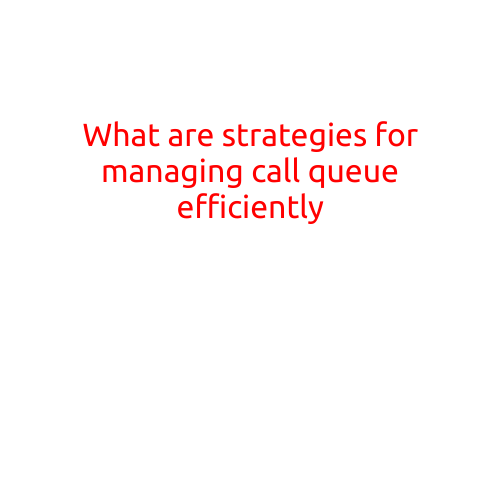
What are strategies for managing call queue efficiently?
Effective management of a call queue is crucial for businesses that rely heavily on phone calls to communicate with customers, clients, or prospects. A well-managed call queue can lead to increased customer satisfaction, reduced wait times, and improved first-call resolution rates. Conversely, a poorly managed call queue can result in frustrated customers, long wait times, and a significant impact on business reputation. In this article, we will explore effective strategies for managing call queue efficiently.
1. Implemented Robust Call Management Software
The first step towards efficient call queue management is to invest in robust call management software. Such software enables you to queue calls, monitor agent activity, and provide customers with real-time queuing information. Some popular call management software options include Avaya, Genesys, and Five9.
2. Prioritize Calls
Prioritizing calls can help you manage the call queue more effectively. You can prioritize calls based on factors such as customer urgency, call type, or product/service complexity. By prioritizing calls, you can ensure that critical or urgent calls are addressed promptly, reducing wait times and improving customer satisfaction.
3. Set Realistic Call Handling Capacity
Setting realistic call handling capacity is critical to efficient call queue management. Measure your agents’ ability to handle calls and adjust your call handling capacity accordingly. Overloading agents with too many calls can lead to longer wait times and poor customer experience.
4. Implement A Call Routing Strategy
Call routing is a critical aspect of call queue management. By implementing a call routing strategy, you can ensure that calls are directed to the most suitable agent or department. This can include routing calls based on agent expertise, language proficiency, or geographic location.
5. Monitor and Analyze Call Queue Performance
Monitoring and analyzing call queue performance is essential to identifying bottlenecks and areas for improvement. Track key performance indicators such as average wait time, call abandonment rate, and first-call resolution rate to identify trends and areas for optimization.
6. Implement A Callback System
Implementing a callback system can be an effective strategy for managing call queues. When a customer is placed on hold, offer them the option of a callback at a later time. This can help minimize wait times and improve customer satisfaction.
7. Use Virtual Hold Queues
Virtual hold queues allow customers to leave their phone number and receive a call back when an agent is available. This can be an effective strategy for managing high-volume call queues and minimizing abandoned calls.
8. Implement A Skills-Based Routing Strategy
Skills-based routing is a strategy that routes calls to agents based on their skills and expertise. By implementing a skills-based routing strategy, you can ensure that customers receive assistance from agents who are best equipped to handle their needs.
9. Reduce Call Hold Times
Reducing call hold times is critical to efficient call queue management. Implement strategies such as providing customers with real-time queuing information, offering callback options, and prioritizing calls to reduce hold times.
10. Provide Ongoing Training and Coaching
Finally, providing ongoing training and coaching to agents can help improve call handling efficiency and reduce wait times. Agents should be equipped with the skills and knowledge necessary to handle complex calls quickly and effectively.
In conclusion, effective call queue management is critical to improving customer satisfaction, reducing wait times, and increasing first-call resolution rates. By implementing a combination of the strategies outlined above, businesses can optimize their call queue management processes and provide a better customer experience.





